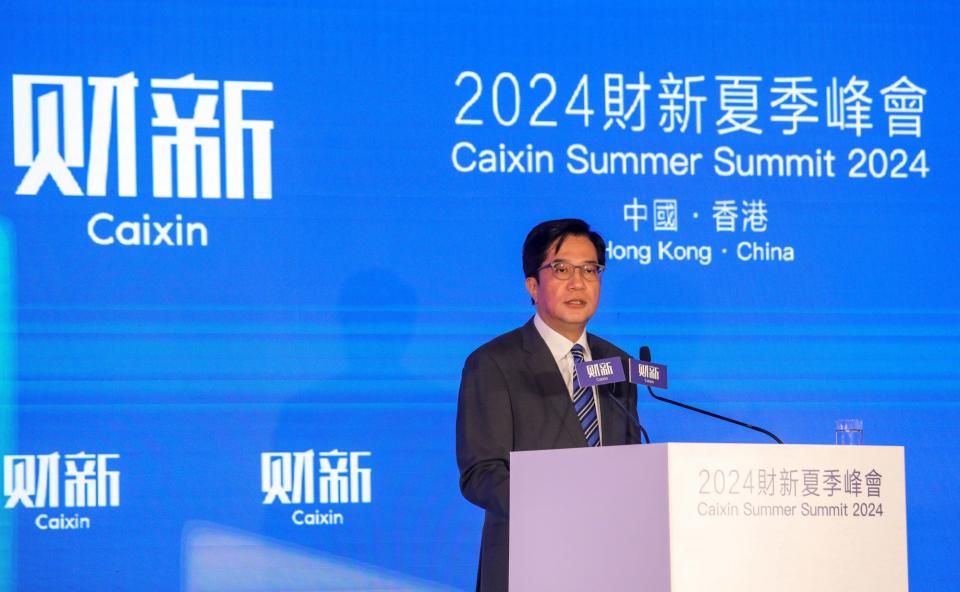'China's London'? Hong Kong's finance hub status will be cemented by mainland's economic development, summit told
Hong Kong's status as an international financial centre will be reinforced by yuan internationalisation and China's economic transformations, according to top finance officials and industry players.
Despite facing "unprecedented changes", Hong Kong's connectivity with mainland China and potential to tap growing opportunities arising from the increased use of the mainland currency globally will consolidate and enhance the city's unique status, deputy financial secretary Michael Wong Wai-lun told the Caixin Summer Summit in the city on Friday.
Hong Kong is already the world's biggest market for the offshore yuan, processing nearly 80 per cent of settlements involving the currency worldwide, Wong said. It had 944.7 billion yuan (US$130.4 billion) in offshore yuan deposits as of March this year, according to Hong Kong Monetary Authority (HKMA) data.
Do you have questions about the biggest topics and trends from around the world? Get the answers with SCMP Knowledge, our new platform of curated content with explainers, FAQs, analyses and infographics brought to you by our award-winning team.
"Hong Kong is working very hard to contribute to the further internationalisation of renminbi," said Wong. "We will continue issuing international bonds denominated in renminbi."
Last year, the city's yuan loans jumped by 140 per cent, and offshore yuan bonds increased by over 60 per cent, Eddie Yue Wai-man, the HKMA's chief executive, said at the same conference.

'Hong Kong is working very hard to contribute to the further internationalisation of renminbi,' Michael Wong Wai-lun, the city's deputy financial secretary, told the conference. Photo: Xiaomei Chen alt='Hong Kong is working very hard to contribute to the further internationalisation of renminbi,' Michael Wong Wai-lun, the city's deputy financial secretary, told the conference. Photo: Xiaomei Chen>
"Whether it's financing or investment, we hope to continue developing the offshore renminbi market in Hong Kong, making the flow of funds smoother, especially strengthening our ties with major trading partners in the Middle East and Asean [the Association of Southeast Asian Nations]," he said.
Saudi Arabia and dozens of other countries have agreed to use the yuan for trade settlements, creating demand for more investment channels in the offshore market. The gradual opening of the mainland Chinese capital market also provides more yuan-denominated assets for international investors and cheaper funding costs in the yuan compared with the US dollar.
"The growth [of yuan] has been particularly fast in the past two years, especially in its use in the real economy in cross-border trades," said Yue. He said the currency accounts for 30 per cent of China's cross-border goods trade settlements, double the proportion two years ago.
The HKMA, Hong Kong's de facto central bank, plans to help the government issue more long-term bonds, maturing in 10, 15 or 20 years, denominated in offshore yuan, to support infrastructure projects, leading to further development of the offshore market for the currency.
Wong would also like to encourage public and private institutions in mainland China to issue offshore yuan bonds, including green and social bonds, in Hong Kong.
Another growth point for Hong Kong is the suite of connect schemes covering stocks, bonds, exchange-traded funds and wealth-management products that give overseas investors access to mainland Chinese financial assets, Wong said.
"Over the past decade, we have clearly seen the huge opportunities brought by connectivity," he said.
Last month, the China Securities Regulatory Commission announced five new measures to enhance the development of the capital markets in mainland China and Hong Kong. These include facilitating listings in Hong Kong by the mainland's industry-leading companies and expanding the Stock Connect cross-border investment scheme.
"We hope that this mutually beneficial, win-win connectivity arrangement can cover more investment products and opportunities in the future," Wong said.
As China transforms its economy, shifting its emphasis towards technology innovation, reform and opening-up policies following President Xi Jinping's "new quality productive forces" initiative, Hong Kong's financial sector will play an important role in helping Chinese companies go global.
"Our financial institutions should help propel the successful transformation of some Chinese enterprises into multinational corporations," Zhang Yichen, chairman and CEO of Citic Capital Holdings, said during a panel discussion at Friday's summit.
"During this process, Hong Kong, as an international financial centre ... particularly with the advantage of 'one-country-two systems', should undoubtedly leverage its strengths and play an important role as a hub and superconnector.
"Hong Kong's status as an international financial centre is irreplaceable by any other cities in China."
Laurence Li Lu-jen, chairman of the Financial Services Development Council, an industry advisory body to the Hong Kong government, said on the same panel that the city will become "China's London" as long as China is on track to become the world's largest economy one day.
"We hope to work together with everyone to tell the Hong Kong story well, driving Hong Kong's economy to a higher level and contributing our part to the country's high-quality development," Wong said.
This article originally appeared in the South China Morning Post (SCMP), the most authoritative voice reporting on China and Asia for more than a century. For more SCMP stories, please explore the SCMP app or visit the SCMP's Facebook and Twitter pages. Copyright © 2024 South China Morning Post Publishers Ltd. All rights reserved.
Copyright (c) 2024. South China Morning Post Publishers Ltd. All rights reserved.

 Yahoo Finance
Yahoo Finance 